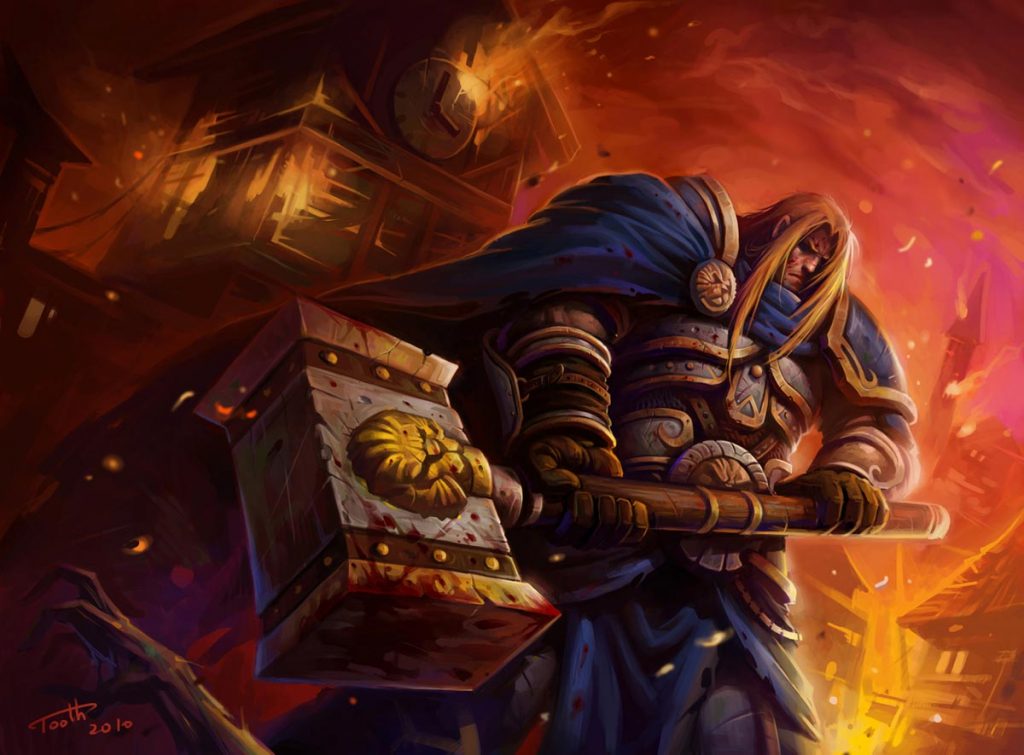Uncategorized
The Dark Paladin
Discuss this post in The Guild Hall!

Arthas is a classic flawed hero-turned-villain story. He keeps company with the likes of Boromir from Lord of the Rings, in that he sought out a powerful weapon in the interest of using it to do good, even though through him it would do great evil. For Boromir, it was the desire for the One Ring and a way to end the evil of Sauron. For Arthas, it was the pursuit of Frostmourne as a means of saving his people from the Undead scourge. Boromir, for his part, turned away from the dark temptation in the final hour and defended the hobbits with his life. Arthas, however, chose another path…
The Not-So-Silver Hand
Arthas, as we mentioned, began as a renowned warrior and well-regarded paladin. Though headstrong and brash, he had a fierce loyalty to his people, and to the troops under his command. His impulsive and stubborn ways could sometimes get him into trouble, however more often than not his tenacity and spontaneity was rewarded, instead. This, in many ways, set up a Negative feedback loop that would eventually lead to his undoing.
We need to remember that it’s important to balance spontaneity and planning in our day-to-day lives. Everyone is some mix of impulsiveness and caution, usually skewing a bit more one way or another (some people to considerable extremes of the spectrum.) It’s important to be flexible in our dealings with others, and able to react and act quickly when needed. At the same time, leaping before you look too often can lead you into serious trouble, as it did with Arthas.
Upon encountering the undead hordes encroaching upon his lands, Arthas immediately leaped into battle against them. While this was initially the correct choice of action, this thirst for battle and vengeance soon lead him to be easily goaded and manipulated by Mal’Ganis. Even when Medivh told Arthas to head west to Kalimdor, Arthas refused to heed his words, instead continuing to focus on settling his score with Mal’Ganis. His tenacity was one of his greatest strengths, although even now it was beginning to lead him astray.
We talk frequently about tenacity, the idea of holding onto a goal or ideal as tightly as you can, and pursuing it to the best of your abilities. In its best forms, this kind of tenacity can lead us to the ideals of someone like Link, from The Legend of Zelda. However, sometimes, as in Arthas’ case, the inability to let something go can be your undoing. Arthas refused to be dissuaded from his path of vengeance, and his obsession led him to be easily corrupted by the call of Frostmourne.
Like spontaneity and careful planning, you need to strike a proper balance between tenacity, and a willingness to let things go. In order to do this, you need to take time occasionally to step back and evaluate what sort of an effect your driving desires are having on your life. Is your determination to accomplish something hurting you more than it’s helping? Often in situations like this, our close friends and family can serve as our own personal Medivh. They can alert you to when a desire is consuming you to an unhealthy degree, and I encourage you to listen to them, instead of ignoring their words of caution like Arthas did.
Fall of a Paladin
In the end, Arthas became consumed by his quest, and it changed him fundamentally as a person. He sought Frostmourne above all else, eventually even the lives of his friends and countrymen, even though he began his quest with the intent to save them. This led further to his madness and corruption, eventually setting him upon the frozen throne as The Lich King.
In many ways, though, we can’t really blame Arthas completely for his fall. Yes, it was his decisions and his choices that led him to the grim outcome, but he was really following the pattern that had worked for him his entire life. Remember the negative feedback loop I was talking about? Arthas found massive success in his young life by being brash, headstrong, impulsive, and tenacious. It took him to higher heights than he could have dreamed even as a young prince, and served him well all the way up to his fateful involvement with The Lich King.
I think our takeaway from this is that we need to occasionally take time to step back and self-assess. Look at the feedback loops in your life. If you have a good thing going for you, by all means, continue it. But also look long and hard at the potential pitfalls this feedback loop can lead you into. Be aware of what blind spots you may encounter, and what hazards may lie on your path. Consult with your own versions of Medivh, Jaina Proudmoore, Uther, and Muradin – that is, your own friends, family, and peers. They often can see things that you can’t see coming, and can help you better yourself in the process.
It’s always worth taking an inward look before making any big leaps in life. Balance your impulsivity and your caution, your tenacity and your flexibility.
In everything you do, try to live boldly, change the world, and continue to be awesome.
Dan “DaRatmastah” Wallace




